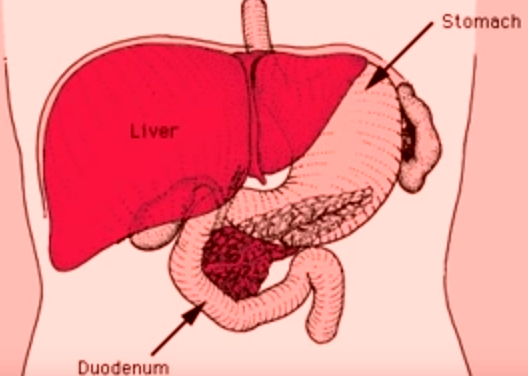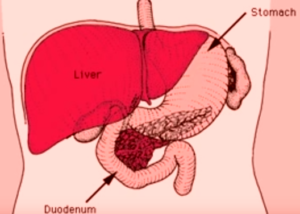The upper middle abdominal region has many organs like the stomach, lower rib cage, gall bladder, small intestine, pancreas, liver, bile ducts, transverse section of colon, and abdominal aorta, etc. Hence, upper middle abdominal pain is usually a symptom of a condition affecting any of the organs present in the region.
Causes of upper middle abdominal pain
Some of the common causes of upper middle abdominal pain along with associated symptoms and treatment options are discussed below:
- Conditions of the Pancreas
- Different conditions may affect the pancreas; inflammation of pancreas is known as pancreatitis. Acute pancreatitis may be caused due to chronic alcohol abuse, gallstones, etc. and may be marked by symptoms like upper middle abdominal pain, nausea, etc. Repeated instances of acute pancreatitis may lead to chronic pancreatitis.
- Long-term instance of chronic pancreatitis may cause the organ to become malignant. Cancer of the pancreas can also occur is there is no underlying case of pancreatitis. Symptoms of pancreatic cancer include poor appetite, weight loss, floating stool, and whitish loose diarrhea
- People with pancreatitis need to be hospitalized. Treatment involves rehydration of body via intravenous administration of fluids, pain medications, and other drugs. Severe cases need surgical repair of the organ. Surgery, chemotherapy, and/or radiation therapy can help treat pancreatic cancer.
- Gastritis
- The condition of inflammation of stomach lining is known as gastritis.
- People with gastritis may suffer from symptoms like upper middle abdominal pain, vomiting, nausea, fever, easy satiety, excessive burps, dark black feces, stomach cramps, heartburn, burning sensation in chest or throat, and stinging pain below breastbone which worsens during or after eating.
- Acute or unexpected gastritis may be caused by stomach flu, food poisoning, increased consumption of acidic or spicy cuisines, abuse of painkillers, aspirin abuse, and elevated production of gastric acid. It is more common in children.
- Long-term, repeated, or persistent case of gastritis is caused by H. pylori bacterial infection, anemia, prolonged food poisoning, or B12 vitamin deficit induced autoimmune stomach wall inflammation.
- Antibiotics help treat bacterial infections. Relevant treatment is prescribed by doctor for other causes of gastritis
- Esophageal conditions
- Occurrence of varices or gullet ulcers may cause upper middle abdominal pain at the time of swallowing. Gullet ulcers typically form due to long-term instance of acid reflux, while alcoholism can trigger varices.
- The esophageal section of upper middle abdominal region may suffer from powerful and painful cramping due to causes such as eating dry food; dehydration linked dry mucus in gullet which triggers distressing, painful passage of food; nerve damage which hampers correct relaxation of muscles that surround the stomach entry point; long term GERD which causes overgrowth of fibrous tissue; or systemic sclerosis
- Mild conditions of the esophagus such as throat dryness may be corrected with home remedies. Severe instances are medically treated according to the diagnosis
- Gastroesophageal Reflux Disease (GERD)
- The condition of abnormal backward flow of stomach contents, enzymes, juices, acids, etc., up the esophagus into the throat/mouth is called GERD.
- People with GERD may suffer from upper middle abdominal pain, heartburn, bad breath, and acidic bad taste in mouth, etc.
- Inadequate shutting of the stomach entry point is the primary cause of GERD. Improper closure of stomach entrance may be caused by conditions like upper stomach hernia, etc.
- Diet changes, medications, exercising, and lifestyle changes can help treat gastroesophageal reflux disease.
- Stomach cancer
- Gastric carcinoma/stomach cancer can occur in people of all ages, but is more common in those aged 50 years and above
- Symptoms of stomach cancer include upper middle abdominal pain, loss of weight, nausea, poor appetite, and darkened black stools, etc.
- Treatment includes surgery, radiation therapy, and chemotherapy
- Gastroparesis
- Gastroparesis is marked by slowing of stomach emptying process which may be caused by inadequate relaxation of muscles surrounding the exit area of stomach (pylorus).
- Symptoms include upper middle abdominal pain, abdominal cramping during or after eating, easy satiety, heartburn, excessive belching, and bloating, etc.
- Gastroparesis may be caused by underlying conditions like diabetes, hormonal disturbances, gastric surgery side effect, nerve damage caused by chronic atherosclerosis, stress and other psychological factors, and fibrous tissue formation after healing of chronic stomach ulcers, etc.
- Treatment is prescribed according to causative factors and generally involves medications, diet and lifestyle changes, and surgery in serious cases.
Peptic ulcers
- Peptic ulcers are open sores that form on the stomach or duodenum wall. Ulcers which form in the initial starting areas of small intestinal lining are called duodenal ulcers, while ulcers on stomach wall are called stomach ulcers.
- Symptoms include vomiting; nausea; dull or stinging pain during time between meals, specifically at nighttime; weight loss; upper middle abdominal pain; poor appetite; and bleeding induced dark or black stools.
- Peptic ulcers are treated with medicines such as painkillers, acid blockers, and antibiotics for clearing underlying H. pylori bacterial infection. Doctors may also suggest lifestyle and diet changes.
Other causes
- Other causes of upper middle abdominal pain include heart attack, intestinal hernia, herniated disc, fractured/broken breastbone, tear of abdominal muscle, abdominal aorta aneurysm or dissection, lymphoma, and/or spine problems, etc.

